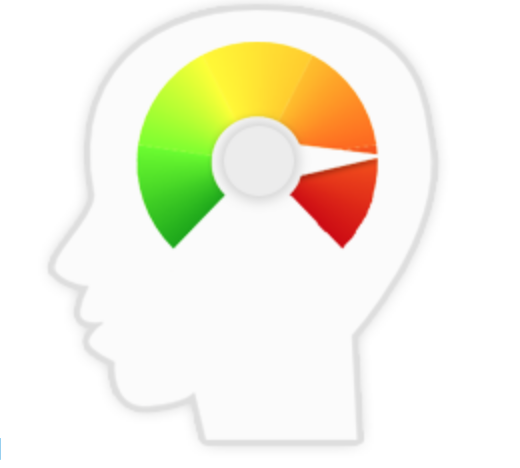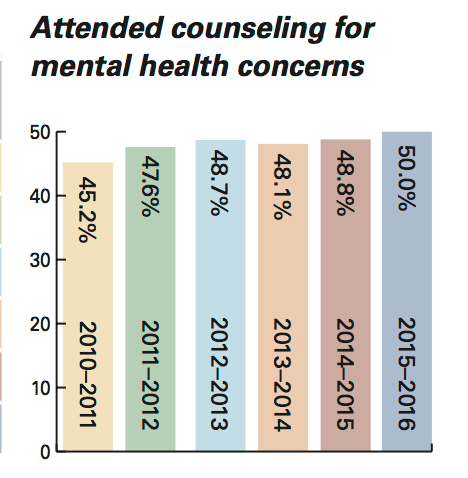On Campus and Off Campus Treatment For Students
Looking at the different options for students seeking mental health help
December 14, 2017
Stress, anxiety, and depression are highly common amongst college students. Work loads and a lack of self care can lead to deteriorating outcomes. Students struggle everyday with balancing a social life on top of their academics. Amidst these dark times, students are readily using the resources available to them on campus.
According to Learn Psychology students often experience stress and anxiety because it is their first time living from home and the academic demand is very high. Melissa Cohen, LCSW said that for students under stress or dealing with anxiety "reaching out to someone is not a bad thing. It is probably the healthiest and most positive thing you can do" (Learn Psychology).
According to Learn Psychology students often experience stress and anxiety because it is their first time living from home and the academic demand is very high. Melissa Cohen, LCSW said that for students under stress or dealing with anxiety "reaching out to someone is not a bad thing. It is probably the healthiest and most positive thing you can do" (Learn Psychology).
20% of college students say they feel stressed “most of the time.”
AP
Many students utilize the resources they have available to them on their campus. These resources range from health services, to nutritionists to psychologists. These psychological services are made readily available for students of a college and offer different forms of treatment.
Recently reported on by NBC, "College counselors are seeing a record number of students who are dealing with a variety of mental health problems, from depression and anxiety, to more serious psychiatric disorders."
The amount of students that have began to utilize campus counseling services has grown by 30%. This is a large increase amongst college campuses. NBC states that "being away from home for the first time, access to alcohol and drugs and the rigorous demands of academic life can all lead to anxiety and depression." Despite the large number of students feeling depressed or anxious while at school, the increase in utilization of counseling services shows to be promising.
Here at The College of New Jersey, the campus offers psychological help for full-time and part-time students.
TCNJ, like many other colleges, offers a variety of psychological treatment options for students. These options are individual counseling, workshops, and group therapy. The counselors on campus offer help in all different areas that students may be experiencing difficulty with.
Dr. Mike Gross, a licensed psychologist, spoke with me about about the counseling services on campus.
"We are typically a short term facility," said Dr. Gross. "Although there are always exceptions to a students needs."
Dr. Gross expressed a lot of happiness regarding how CAPS is ran. "There are thousands that we have helped over the years," said Dr. Gross. "I'm happy to know how it has helped."
The counseling center has ten therapists on staff that are dedicated to treating students.
Just like TCNJ, Princeton University also has a beneficial counseling facility.
Princeton University also offers psychological help for full-time and part-time students on their campus.
Dr. John Kolligian, Jr., the executive director of University Health Services at Princeton University, oversees the operations of the facility. Princeton, like other universities, offers many treatment options for students on campus including: individual counseling, couples counseling, and longterm treatment.
"We have trained professionals who have one goal - to help our students," said Dr. Kolligian.
At Princeton, their psychological facility is comprised of 12 therapists that seek to help students in confidential and welcoming environments.
Just like TCNJ and Princeton, Rider University, who is in the same area as the two, makes it their goal to better than students and their mental health.
Rider offers psychological help to full-time and part-time students on their campus. Just like TCNJ and Princeton University, Rider offers many different types of counseling services like individual and group therapy.
Dr. Stephanie Jacobs is one of the three counselors at Rider University. Her main objective is to make sure the students are comfortable during their sessions and receive helpful treatment.
"There is nothing better than seeing students seek out help," Dr. Jacobs said. "I admire the students that want to make a change within themselves."
The students that see Dr. Jacobs are typically experiencing anxiety symptoms with some being more severe cases.
What happens to students that want to explore off campus options?
College counseling services offer help to students when searching for an off campus provider.
"Many students require ongoing support that is more specialized, intensive, or extensive than is available on campus" (“Off Campus Counseling Referrals.”).
The big problem when it comes to finding an off campus provider is finding one who takes your insurance. Many psychological services have large copays, which often deters students from making the choice to continue treatment. Along with this, many insurance companies do not provide great coverage for mental health.
According to the American Psychological Association, "in the past, many health insurance companies provided better coverage for physical illness than they did for mental health disorders." However in 2008, the Paul Wellstone and Pete Domenici Mental Health Parity and Addiction Equity Act was passed which made insurance companies cover mental health services.
Unfortunately, not many people know that this exists and even with this law, many students find that the copay that comes with the visit can be expensive and add up, something that becomes a large factor for students, especially if they cannot afford to regularly pay these fees. Although there are these roadblocks for students, college counseling services will provide students with the resources to affordable treatment.
"There are low cost option for students. We explore low cost options," said Dr. Gross. "There is always someone who can take their insurance."
There are always psychological providers in the area and it is the therapist's job to ensure that you find someone who you are comfortable with. With the help of databases, students can narrow their searches by insurance and location.
For many students, the on campus resources are meant to be temporary and as more of a kick start to their treatment. TCNJ, Princeton University, and Rider University all have access to these referral databases for students to find a provider either near the school or their hometowns.
Princeton's website states: "When a student wishes to see a mental health professional in the community or would like more consistent ongoing therapy or psychiatric treatment than CPS can provide, we can refer you to an appropriate outside therapist, psychiatric provider, or treatment program."
"We look at places with affordable care. There are low cost option for students," said Dr. Gross. "We explore low cost options and we have different places that meet with students who cannot afford therapy."
There are many options outside of the campus, however, sometimes these options are not ideal for a student.
"If a student is not comfortable with these options, we can work out a case of extensive care on campus," said Dr. Gross. "We would never turn away a student because he or she cannot afford to continue treatment."
The options for students seeking psychological help are extensive, even if it comes down to money. Students are able to receive treatment no matter who they may be. Since mental health is an important topic on college campuses, the resources must be extensive.
Some of these options include attending group therapy sessions, which are free and easily available for students. However, if a student works better with individual counseling, the facility on campus will often offer extensive treatment.
After seeing the rise in students seeking out help for mental illness, it is imperative that colleges remain open and resourceful. With the stress that academic work can bring on a person, it is best that students are aware of the treatment options available to them.
Students here have expressed a great fondness of the services we provide and how we aim to help our students. A sophomore, who wished to remain anonymous, said "I enjoy everything CAPS has done for me. Some people do not like the way they run things, but I think if they were to give them a try, they might just find that it really is a great resources."
Although there is still a stigma surrounding mental health, it is truly amazing to see that there are therapists who dedicate their time to working with students and ensuring that they are healthy mentally.
Students that may feel alone or unsure about their mental health should always know that there are people just like them. Many students are often nervous to begin exploring treatment options.
"The hardest part is to make the initial phone contact," said Cohen. However, making that first step toward working on your mental health can be one of the greatest decisions a student can make. Students should always remember that they do not need to go through the stress of college by themselves. There are options for professionals to help guide them and make that first step.
| Hotline | Phone number | |
|---|---|---|
| Suicide Prevention | 1-800-273-TALK | |
| NJ Hopeline | 1-855-654-6735 | |
| 2nd Floor Youth Helpline | 1-888-222-2228 | |
| LGBT Resources Trevor | 1-866-4u-TREVOR | |
| GLBT National Helpline | 1-888-843-4564 |







Leave a comment
You must be logged in to post a comment.